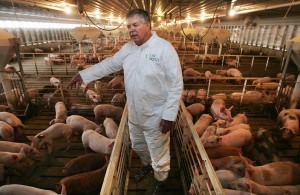 Following the North Carolina General Assembly’s rushed passage of SB 711, which would significantly limit the rights of neighbors of industrialized hog farms to sue for nuisance and significant pollution of their air and water, several advocacy groups, including; Center for Biological Diversity, Food & Water Watch, Public Justice, Socially Responsible Agriculture Project, and Waterkeeper Alliance issued the following statement:
Following the North Carolina General Assembly’s rushed passage of SB 711, which would significantly limit the rights of neighbors of industrialized hog farms to sue for nuisance and significant pollution of their air and water, several advocacy groups, including; Center for Biological Diversity, Food & Water Watch, Public Justice, Socially Responsible Agriculture Project, and Waterkeeper Alliance issued the following statement:
“We call on Governor Cooper to continue his record as a champion of all North Carolinians – and especially those who call the rural communities of our state home – by standing with our state’s citizens and against those contaminating our air and water, by vetoing SB 711. The coalition of legislators who have tenaciously and heroically fought this dangerous bill and stood with families and communities as they take on these polluters, must also stand with the Governor and sustain the veto.
The proponents of this bill have tried to mislead politicians and the public into thinking it is a referendum on support for North Carolina’s agricultural industry. That’s not true. The people of North Carolina have long welcomed, worked for and promoted safe and responsible agriculture in our state. This bill is not about pulling back the welcome mat for those who are good neighbors; it is about providing legal immunity to those who are robbing their neighbors of the right to enjoy the open air, clean water and beautiful land that we value in North Carolina. We shouldn’t be rewarding those who are polluting our state and harming our neighbors. We should be looking out for North Carolina workers and families who call this state home. By vetoing this bill, Governor Cooper can send a strong message that, while North Carolina remains open for business, it also remains a place where the quality of life and access to abundant and clean water and the air is a priority. We must not allow irresponsible actors to taint our natural resources or our state’s reputation as a place that puts its people first. These are values all North Carolinians hold dear.”
SB 711 would also force companies to rename ‘soy milk’, ‘coconut milk’, ‘almond milk’, ‘cashew milk’, etc. starting on January 1st, 2019.
Page 5 of SB 711 states;
DIRECT DEPARTMENT OF AGRICULTURE AND CONSUMER SERVICES TO ADDRESS MISLABELING OF PLANT-BASED PRODUCTS AS “MILK”
SECTION 6.(a) The following definitions apply to this section:
(1) “Department” means the Department of Agriculture and Consumer Services.
(2) “FDA” means the United States Food and Drug Administration.
(3) “Milk” means the lacteal secretion, practically free from colostrum, obtained by the complete milking of one or more healthy hooved mammals. Hooved mammals include, but are not limited to, the members of the Order Cetartiodactyla, such as: Family Bovidae (cattle, water buffalo, sheep, goats, yaks, etc.), Family Camelidae (llamas, alpacas, camels, etc.), Family Cervidae (deer, reindeer, moose, etc.), and Family Equidae (horses, donkeys, etc.).
SECTION 6.(b) In accordance with the established standard of identity for milk defined in 21 C.F.R. § 131.110 and the Pasteurized Milk Ordinance, the Department shall immediately develop an enforcement plan to enforce FDA’s standard of identity for milk as adopted in the North Carolina Administrative Code to prohibit the sale of plant-based products mislabeled as milk.
SECTION 6.(c) No later than 90 days after the effective date of this act, the Department shall begin to implement its enforcement plan, which shall include, but is not limited to, notification of the Department’s intent to embargo all mislabeled products offered for sale in this State. All plant-based products displayed for sale in this State shall be labeled in accordance with FDA’s standard of identity for milk and the Pasteurized Milk Ordinance no later than January 1, 2019.
What are your thoughts on SB711?


